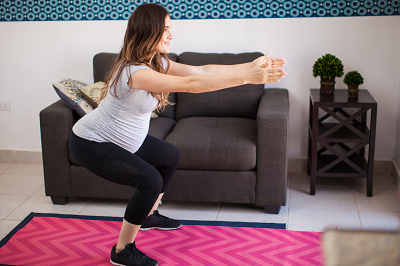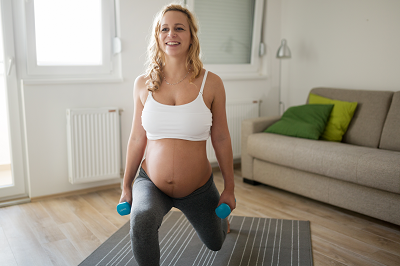
Prenatal Exercise Tips
Congratulations! You are pregnant and are over the moon about adding a little one to your family. As with any new adventure, you have questions. When it comes to pregnancy, especially a first pregnancy, you may be wondering if exercising is safe and which exercises you can do/should avoid. Many factors should be considered when you train during the prenatal period – any medical conditions treated prior to pregnancy, old or current injuries, and if you or baby have any complications during pregnancy are a few things you should discuss with your provider. But if you are healthy and experiencing a healthy pregnancy, there is no reason you can’t begin or continue a fitness routine! Exercising during pregnancy is beneficial to both mom and baby. It can prepare you for labor and birth, give you more energy, improve your sleep, remedy the aches and pains of pregnancy, and help you avoid gestational diabetes! And if mom is benefiting from exercise, so is baby!

Squatting is also a great position to labor and birth in, as it helps to widen the pelvic outlet.
Top 5 Prenatal Exercise Tips:
- Pay attention to how you feel before, during, and after exercise. You will learn what is normal for your body and will then be able to notice if something is wrong. Every mom-to-be has a different fitness baseline.
- Do a broad range of exercises – weight training, aerobic exercise, and stretching will enhance your strength, flexibility, endurance, and balance. These are all necessary to carry your growing baby, support your changing body, and to prepare you for labor and birth.
- Stay hydrated, stay fueled, stay cool! You may need to drink more water than usual when you are exercising, especially during the warmer months, and eating will keep your blood sugar from dropping. Exercise in an area that is well ventilated to avoid overheating.
- Squat! A proper squat calls on all of the major muscle groups and helps to maintain strength, flexibility, and balance (and endurance if you do them in sets!). Squatting is also a great position to labor and birth in, as it helps to widen the pelvic outlet.
- Especially if you are new to a fitness routine, seek the guidance of a trainer who is certified in and/or educated on exercise during pregnancy.
Exercise during the First Trimester:
- No more sit-ups! Or anything that causes flexion of your trunk. Your body begins to change as soon as you become pregnant (before you may even realize you are expecting!) and adding more strain to an area that will already be compromised can cause problems like Diastasis Recti (which can also lead to pelvic floor dysfunction) early in pregnancy and make it harder to recover after birth.
- A little goes a long way. Due to morning sickness and fatigue, you may not feel feel like doing a complete workout. That’s ok! Any movement is beneficial. Consider a short walk, a yoga flow, or a few squats throughout the day.
Exercise during the Second Trimester:
- Train for birth. You are probably feeling better as the morning sickness subsides! Exercise in a way that mimics labor – work out for a certain amount of time and rest for a certain amount of time, for example 30 seconds of work followed by 30 seconds of rest.
- Stretch. Flexibility improves the range of motion of your joints, which is essential for exercising safely.
- Work with your changing body. Practice exercises that test your balance (ie: yoga, lunges) and endurance (ie: long walks, riding a stationary bike, or running if it’s still comfortable).
- Safety is key! Avoid exercises that pose a risk of falling, like jumping over or onto objects. Also avoid contact sports.
- Ditch the barbell. If you enjoy olympic lifting, switch to dumb bells because your growing bump is starting to get in the way!
Exercise during the Third Trimester:
- Keep up the good work! Continue working on your strength, flexibility, balance, and endurance a few times per week, but with decreasing intensity as you near your due date.
- Have fun! Exercise should always be enjoyable, but towards the end of your pregnancy your movement should make you feel good and empowered.
Happy moving, mamas!
Alicia Van Balen, Regional Director, BIRTHFIT South Pittsburgh

Leave your comment